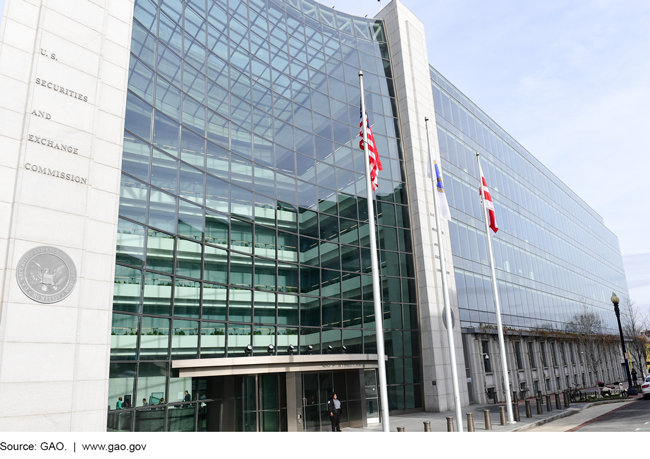Financial Audit: Securities and Exchange Commission’s FY 2019 and FY 2018 Financial Statements
Fast Facts
The Securities and Exchange Commission enforces securities laws that protect investors. The SEC reported assessing $1.3 billion in penalties and damages for securities law violations in FY 2019. Some of that goes to the Investor Protection Fund—which rewards whistleblowers and supports investor education.
Each year, we audit and issue an opinion on the financial statements of SEC and its Fund, and on the effectiveness of SEC’s internal controls (e.g., ability to ensure that transactions are properly authorized and recorded). In FY 2019, we found the statements were reliable and that SEC's controls over financial reporting were effective.
The headquarters for the Securities and Exchange Commission.

The front of the Securities and Exchange Commission building
Highlights
What GAO Found
GAO found (1) the United States Securities and Exchange Commission’s (SEC) and its Investor Protection Fund’s (IPF) financial statements as of and for the fiscal years ended September 30, 2019, and 2018, are presented fairly, in all material respects, in accordance with U.S. generally accepted accounting principles; (2) SEC maintained, in all material respects, effective internal control over financial reporting for SEC and for IPF as of September 30, 2019; and (3) no reportable noncompliance for fiscal year 2019 with provisions of applicable laws, regulations, contracts, and grant agreements GAO tested. In commenting on a draft of this report, SEC stated that it is pleased that GAO found that SEC’s financial statements and notes were presented fairly, in all material respects, in conformity with U.S. generally accepted accounting principles.
Why GAO Did This Study
The Accountability of Tax Dollars Act of 2002 requires that SEC annually prepare and submit audited financial statements to Congress and the Office of Management and Budget. The Securities Exchange Act of 1934, as amended in 2010 by the Dodd-Frank Wall Street Reform and Consumer Protection Act (Dodd-Frank Act), requires SEC to annually prepare and submit a complete set of audited financial statements for its IPF to Congress. In accordance with the authority conferred in the Chief Financial Officers Act of 1990, as amended by the Government Management and Reform Act of 1994, GAO audited the SEC and IPF financial statements. Section 963 of the Dodd-Frank Act further requires that (1) SEC annually submit a report to Congress describing management’s responsibility for internal control over financial reporting and assessing the effectiveness of such internal control during the fiscal year; (2) the SEC Chairman and Chief Financial Officer attest to SEC’s report; and (3) GAO assess the effectiveness of SEC’s internal control over financial reporting and evaluate, attest to, and report on SEC’s assessment. Accordingly, this report also includes GAO’s reporting in response to the requirement under the Dodd-Frank Act.
For more information, contact James R. Dalkin at (202) 512-3133 or dalkinj@gao.gov.
